
Полная версия
Remember this! Don’t let it sink into oblivion! Second edition. The life and death of the Pioneer Base «Oceanrybflot»
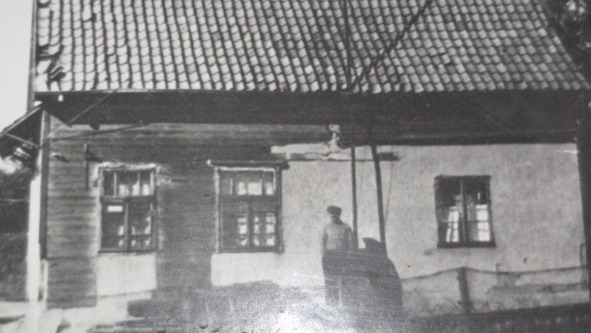
The first office of the fish factory.
The boats were pulled ashore overnight. In the basement, there was a warehouse, where fish were taken from the pier on trolleys. In the same year, out of the Astrakhan fish farm “Astrakhanets” with six experienced fishers was seconded to the disposal of “Baltgosrybrest” Zimovin Pavel Andreevich (one of the first captains). In 1950, MRI “Snetok” (Captain Zimovin) won the prize in the All-Union Socialist competition. And in 1958, for his work, Captain Pavel Andreevich will be awarded the Order of Lenin. Now 32 people worked at the Neukuhren fish factory. At the head of this first fishing, the enterprise was director Yakov Goncharov. The whole plant is one apartment building, converted into an office. At the end of August 1946, the Neukuhren Fish Factory received five small fishing trawlers off the KFC type, Germany built. These were unsuitable
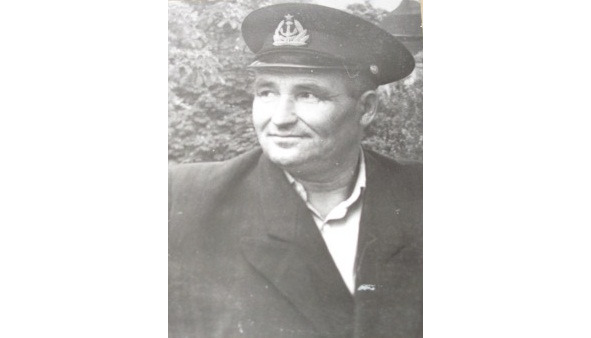
Zimovin P.A.
fishing vessels. The military trawled mines in the Baltic Sea. Then they handed them over to the fishery. There was no equipment on them. The fish caught was on the deck, there were no holds. From the stern were given trawls and all the fish was chosen by hand. Of the vehicles at the fishery, there was only one horse. Here I would like to bring the memories of the captain of the long-distance voyage Tatarinov Y.P., who began his sea life on the ships of our base. These of his memoirs are outlined in the book “The Fishermen’s Week, in Jest and seriously” edited by the writer-compiler, captain of the second rank, Associate Professor Baltic State Academy V.S. Emanov.
“In 1946 he started working on the KFC (military minesweeper). He worked for the Neukuhren Fish Factory. The crew of the KFC consisted of 5 people. Captain, assistant captain, mechanic, motorist, and sailor. KFC is a wooden vessel about 20 meters long, 4 meters wide, and 1.2 meters high. With winds of 4 marks, the KFC was not released from the port. The first low-power radio stations appeared only at the end of 1947. There were two cubicles on the ship. The bow cubicle housed the team, and the second cubicle was remade under the hold. The vessel had a 120 h.p. engine. Ship speed developed to 8 knots. It was not suitable for trawling. But still had to work and fish.
With the advent of 1947, the duration of fishing increased to 3 days. Then came a new MRT from Denmark, Finland, and Sweden. There were also well-known captains Volodin, Zimovin, Chechetkin Arkady Vasilyevich, Manakin N.Y., Zelenov, Azarenko. On March 15, 1948, he completed the course and returned to Pioneers. UTF at the time was headed by G.Y. Ermoshkin. But soon he was arrested, and he disappeared without a trace. On July 20, 1948, we were going fishing to the shores of Iceland. Along with the floating base, Tungus was an expedition. On the RS-4 “Wave” was a civilian captain Shprygin. The crew consisted of 17 people. We was been working for about three months. RS-4 caught 110 tons, and the smallest catch was 25 tons. When they returned to the port, the captains were calculated and sent to the military units, and the seiners began to prepare for distillation to the Caspian Sea and the Black Sea. Only the RS-5 remained in the UTF, where I was the captain, and Ilyin Georgiy Fydorovich was the chief. In 1950, after the Mamon training and course combine, I became the second navigator of the SRT-184 “Syryanin” where the captain was Fedor Sergeyevich Semyonov.” Historic – the archaeological museum “Rantava” of the city of Pioneers allowed me to publish some photos of pioneer fishermen of that time. Here they are.
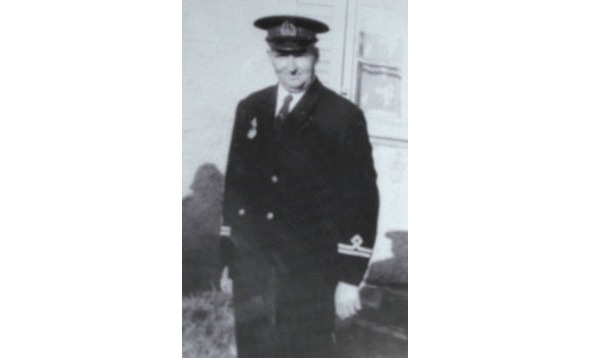
Zimovin P.A.
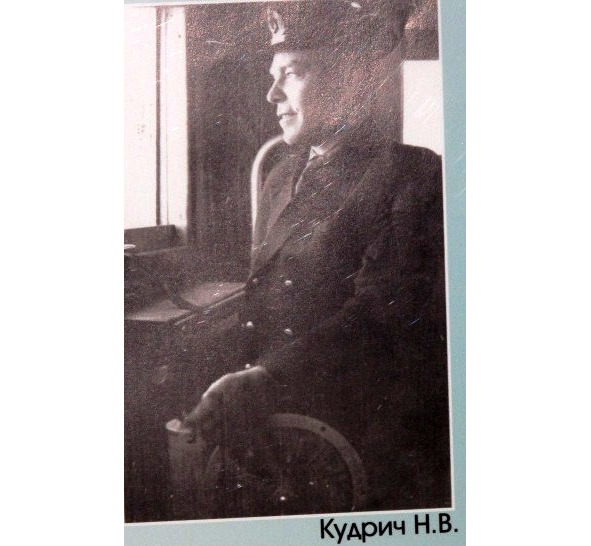
Captain Pavel Andreevich Zimovin, Captain Kudrisch N.W.
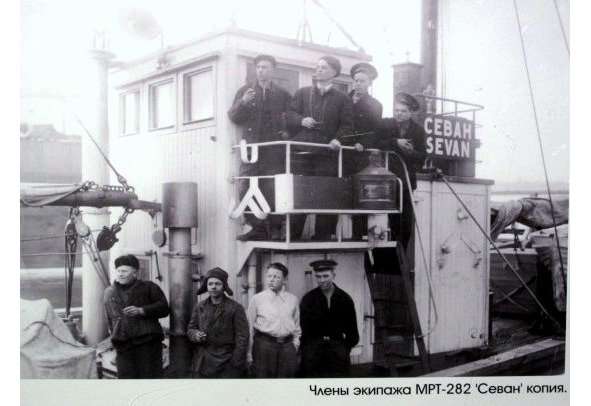
The crew of the MRT – 282 “Sevan”.
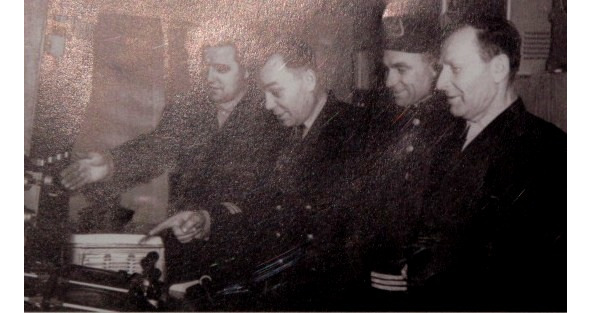
Guests in the captain’s cabin.
And in the photo below, four “sea wolves” cheerfully walk on the wooden flooring of the Pioneers pier. From left to right: captains V.M. Bykov, I.A. Savchuk, NI. Sizov, N.D. Ivchenko. Makeev Gennady was born in 1930. He graduated from Mamonov’s combine. In 1956 he became a senior mechanic. He sailed on many types of PBORF vessels. He went to the seas until 1987. His work experience is 45 years.
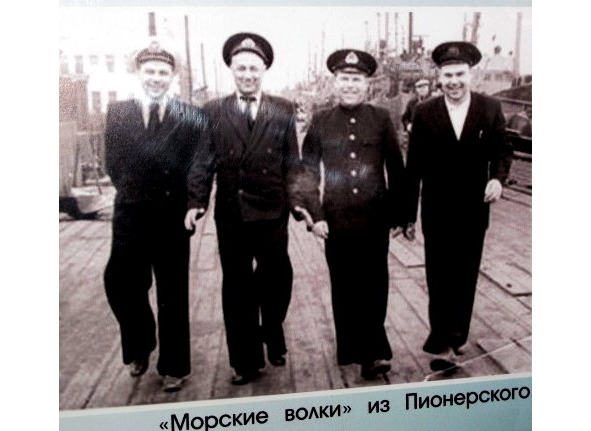
In the port, the sea soul laughs and sings.
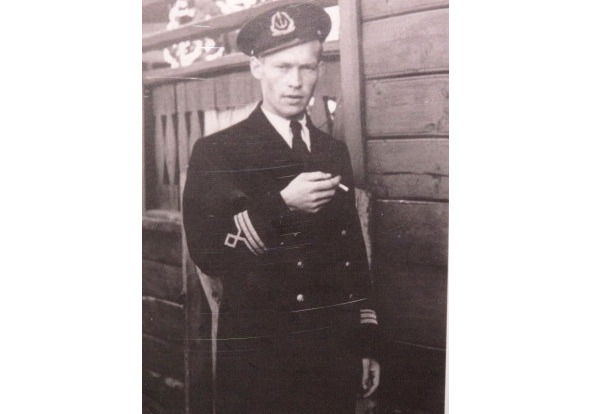
Senior Mechanic Gennady Makeev.
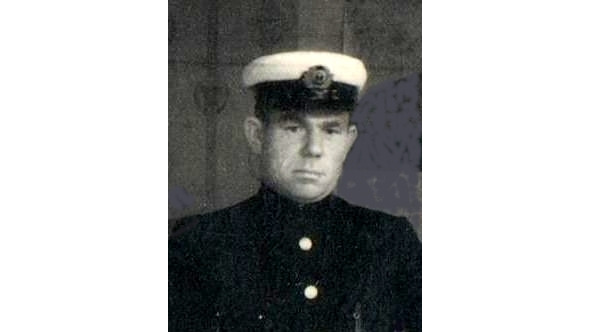
Volodin Alexei Artyemevich.
Memories of the captain of the long-distance voyage Tatarinov Y.P., about the famous captains of the base in early 1947, should be necessarily supplemented by the story of son Victor about his famous father – Captain Volodin Alexei Artyemevich. Victor was one of the first to read the electronic version of this book of the first edition and wrote me a letter. Here is it.
“Hello, dear Vyacheslav Fedorovich! I read on the internet your book “Remember this! Don’t let it sink into oblivion!” Strong, detailed, truthful, and useful to young people if they recognize the past.
Understanding the name of the work literally, I want to ask you, if possible, to supplement the material with information from 1946—1947 about the Knight of the Order of Glory of the 3rd degree, one of the pioneers of the Baltic, undeservedly forgotten captain of MRT “Fearless”, Volodin Alexei Artemyevich.
I mean the electronic version of your book. To keep the memory of the sailors, and “did not fall into oblivion,” please help “patch the gap” in the archive of the history of PBORF. Agree that without stories about the very first captains of the late 40s of the last century, the history of the base will not be quite real. I send you the surviving evidence of the modest merits of A. A. Volodin at that harsh time. I hope that we will be able, speaking in the sea language, to start a “patch” on the hole that happened at the Ship of Historic Memory of PBORF, which Captain A. Volodin gave the last thirty years of his life.
With a deep respect for you, Victor.”
Naturally, I immediately, having learned the address of Victor, sent him his copy of the book. And I received a reply of this content:
“Dear Vyacheslav Fedorovich! Received your wonderful book, why immensely happy and eternally grateful for such a gorgeous gift. To have a book about my small homeland, about the port and the city in which he was born and raised 70 years ago, is worth a lot. I think that if my father had seen it, I would certainly have supported me in this assessment. Thank you so much for creating it! Victor Volodin, Kolpino, Leningrad region.”
Agree that such a letter warms the soul of the author and makes more serious work on the material. That’s why I started with Victor to “plant a patch on the hole at the Ship of Historical Memory of PBORF”, which the Knight of the Order of Glory, the honored Captain Volodin Alexey Artemyevich gave the last thirty years of his life.
Victor sent a picture of his father. In 1939, Alexey Artemyevich graduated from the course of river-sea navigations in the city of Astrakhan. Until the war, he was walking across the Caspian Sea as an assistant captain on the Tobolsk fishing seiner. On June 27, 1941, he was drafted into the active army by the district military enlistment office in the village of Ukryanya.
1412 days and nights brought Victory closer in the mother – infantry ordinary machine gunner. He was wounded three times. The fourth year of the war ended on the Kurland Peninsula in the 8th separate Guards Mitava Liaison Battalion of the First Rifle Corps. He was awarded the Order of Glory of the 3rd degree and the Medal for Victory over Germany. After the war, he was recruited to the Koenigsberg region. On April 27, 1946 (as recorded in the workbook) Alexei Volodin was hired in the Neukuhrevsky Fish Factory as captain of a motorcycle boat. As soon as other minesweepers were received, he was appointed for an MRT – “Fearless”, onboard which was committed a lot of labor feats, which, perhaps, you will not remember. In 1947, Alexey Artemyevich was nominated by the base’s workers and Pioneersk residents as deputies of the Kaliningrad Regional Council of Deputies.
Here is a preserved view of the candidate Volodin.
VolodinAleksey ArtemyevichCandidate for deputies of the Kaliningrad Regional Council of Workers’ Deputies
for Pioneer constituency No. 63.
The famous fisherman Alexey Artemyevich Volodin was born in 1914 in the village of Karalat, Kamyzyak district, Astrakhan region, in the family of a fisherman. As a 13-year-old boy, he began working as a fisherman in the fishing collective “Memory of Kuibyshev” in his homeland. Since then, he has not parted with his profession.
In 1939 he was appointed captain on the ship of the fishing collective “Memory of Kuibyshev” and then as captain of the sea fishing in the city of Astrakhan, where he worked until the summer of 1941. During the Great Patriotic War, Alexey Artemyevich was in the ranks of the active Army. He participated in the liberation of Donbas, the Crimean Peninsula, the Baltic republics. Awarded the “Order of Glory” of the Third Class and the “Medal for Victory over Germany”.
In 1946 he enlisted in the Baltgosrybtrest and was appointed to Pioneer fishery as captain of the “Fearless” fish trawler. Under his leadership, the trawler’s team fulfilled the annual plan by October 8. Participating in the All-Union Socialist Competition, the team for work in the second quarter received a monetary prize and a rolling pennant of the ministry.
Now Captain A.A. Volodin and his team are fighting for the implementation of the second annual plan by November 7, 1947. A non-partisan Bolshevik, who fervently loves his homeland, Alexey Volodin is registered as a candidate for deputies of the Kaliningrad Regional Council of Workers’ Deputies in Рioneer constituency No. 63
And this is the order No.121 of August 26, 1947 for the Baltic State Fisheries Trust. He celebrates and encourages the editorials of the All-Union Social Competition in the second quarter of 1947.
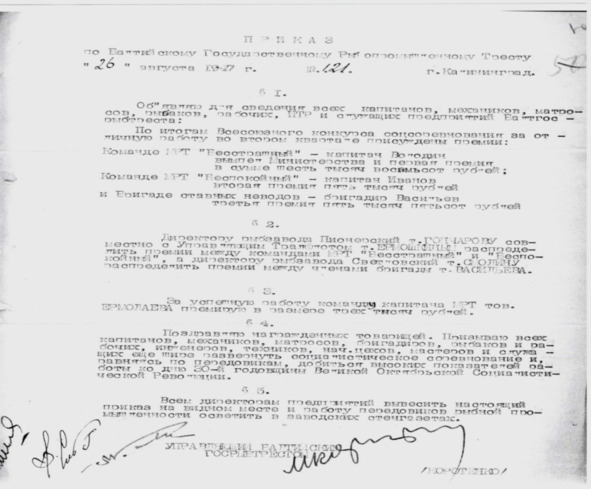
Order on the Baltic State Fisheries Trust “August 26, 1947.” No. 121 Kaliningrad
“1”
I announce for the information of all captains, mechanics, sailors, fishermen, ITR, and employees of the Enterprises of The Baltgosrybtrest: As a result of the All-Union Competition competition for excellent work in the second quarter Prizes were awarded:
The team of MRT “Fearless” – Captain Volodin, pennant of the Ministry and the first prize in the amount of six thousand eight hundred rubles;
The team of MRT “Restless” – Captain Ivanov, the second prize, five thousand rubles and
a brigade to put of seine-nets – Brigadier Vasilyev, the third prize, five thousand five hundred Rubles.
“2”
The director of the Pioneersk fishery, T. Goncharov, together with Governor Tralflot T. Yermoshkin, distributed the prizes between the teams “Fearless” and “Restless”, and the director of the fishery Svetlovskiy T. Smolin to distribute the prizes among the members of the brigadier Vasilev.
“3”
For the successful work of the team captain Yermolayev a pre-peace of three thousand rubles.
“4”
Congrats to the award-winning comrades. I call on all captains, mechanics, sailors, brigadiers, fishermen and workers, engineers, technicians, shop heads, craftsmen and employees to expand the socialist competition even more widely and, equal to the editorials, to achieve high performance of the co 30th anniversary of the Great October Socialist Revolution.
“5”
All directors of enterprises to put this order in a prominent place and the work of the editorial industry to illuminate in the factory wall newspapers.
Manager of the Baltic State Trust (signature) /Korotenko/
In 1953, Captain Volodin Aleksey Artemyevich was included in the book of honor.
The testimony remains. Here is it.
For the high production performance achieved in the socialist competition. Volodin Aleksey Artemyevich was put down to the Book of Honor of the Baltgosrybtrest and the Trade Union Committee on December 30, 1953.
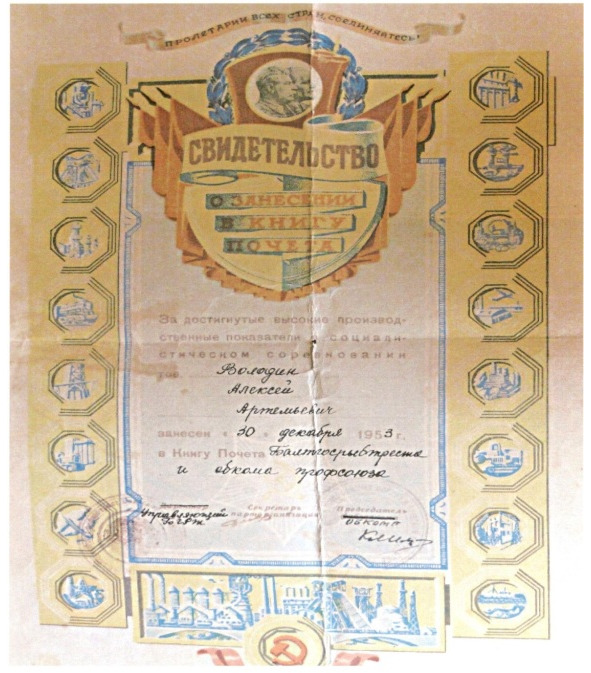
Certificate of entry into the book of honor.
According to Victor’s son, the veteran of war, a Chevalier of the “Order of Glory” and a medal for “Victory over Germany”, even before the war was closely associated with the fishing industry of the Soviet Union. He fed the country with fish, working on fishing vessels of the Caspian basin. But as soon as the terrible hour came for the country, he joined the ranks of the defenders of the Fatherland. A simple machine gunman went through the whole war.
He was wounded three times, but always returned to the front line. In the spring of 1946, having removed the military gymnast, he returned to the front line. Now it’s a worldtime front. The victorious Great Country needed food. And Alexey Artemyevich went to sea again. But it was a different pool. The Baltic Sea lovingly received a professional fisherman. They understood each other. But severe military wounds undermined health.
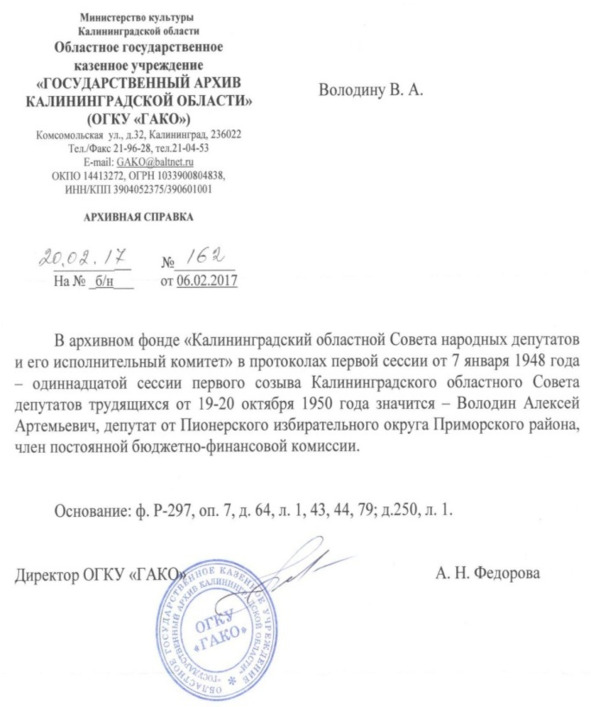
This is the above-mentioned archival document about his father sent to me by Viktor Volodin.
It says:
In the archive fund “Kalingrad Regional Council of People’s Deputies and its Executive Committee” in the minutes of the first session of January 7, 1948 – the eleventh session of the first convocation of the Kaliningrad Regional Council of Workers’ Deputies October 19—20, 1950 is Volodin Aleksey Artemyevich, a deputy from the Pioneers constituency of the Primorsky district and a member of the permanent budget and financial commission.
And below you’ll read his memories of his father. I bring it in its entirety, preserving the author’s style.
“Early left without a father, Alexey 13-year-old learned various methods of fishing in strange farm, and simply farm labourered. It’s a good thing he was strong born. I had to survive somehow, helping Maria’s mother. With the formation of fishing collective farms, he settled in the artel, where along with experienced catchers mastered the collective extraction of live silver on rivers, currents and in the Volga Delta. In society, his efforts to fish, strong hands, knowledge of feeding and spawning of fish, the ability to navigate the river, appreciated, and entrusted to the smart young man to manage the barge. Since then, Alexei, a 14-year-old capten, they began to respectfully magnify Artemych.
In the future, he said, everything was more or less successful. He’s firmly on his feet. There was prosperity in the house. Then they did not think to pay for the work of fishermen with work-days – chopsticks. He’ll be the one to try later when he gets back from the army. And soon the time came to marry, and in the bride Alexey chose the simplest girl Klava, the daughter of Arkhipov Mikhail Fedorovich. Looking ahead, I can say that my parents lived together for 42 years, until the last day of our father. They raised four children, although there could have been more if not for the disease. And they had everything in common, as in people.
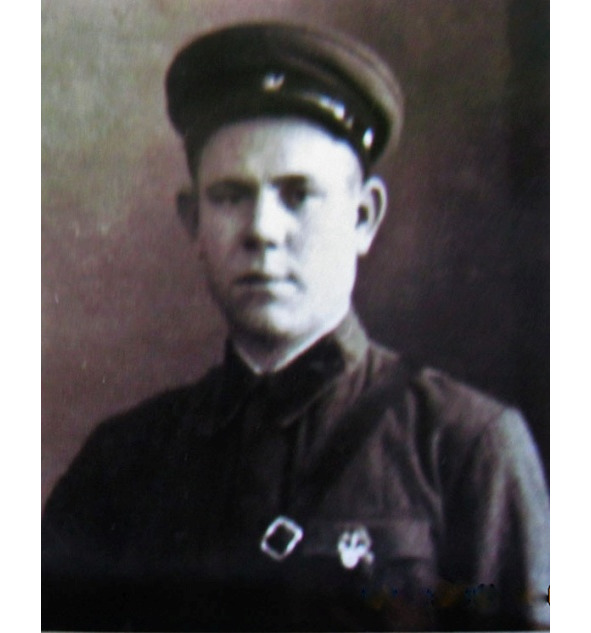
Volodin A.A.
In 1935, Volodin was born his first child – our older brother Michael. And the next year my father was called up for urgent military service. He served in the city of Leningrad. Demobilized, he already knew firmly that he would devote himself to the fishing fleet. Whether there was a share of romance, I do not know, but the day after returning from the army, my father took the documents to Astrakhan College for courses in ship navigation, there just ended the reception. It was accepted without unnecessary talk, and the next 1939 it was made of a river peasant- catcher, a shipmaster of ships of the type river-sea. Unfortunately, the document has not been preserved.
Returning from studying at the fish farm “Memory of Kuibyshev” father for a long time could not apply the knowledge in practice: there was no fleet in the collective farm and did not allow to leave. And only with grief in half, literally, after the death of five-month-old son Vitaly, Alexey Artemyevich was released on “free bread.” And a couple of days later, on July 8, 1940, Alexei Volodin was hired by the “Morlov” Volgo-Caspian Trust helmsman. In this position, on the Seiner “Tobolsk”, he began to get acquainted with the Caspian sea on a real ship. After the first trip, Alexei Volodin was appointed assistant captain, and again, as before the army, everybody began to call Artemych gratefully…
However, this benevolent idyll did not last long. The famous events of June 22, 1941, which broke the fate of millions of Soviet people, did not bypass the Volodin family… Aleksey Artemyevich was summoned to the RVC on the fourth day of the war. My mother said that she would remember this black Thursday, June 26, 1941, forever. The day when life was instantly divided into “before and after.” And between them the unknown at the age of four?.. My father was lucky, he returned from the war. Wounded, with a tormented soul and body, but alive.
I do not know, of course, as other front-line soldiers, but our father did not like to remember the war, although for sure he had something to tell the boy. Three wounds, the first near the Northern Donets, near the Ukrainian village of Krestish, the most severe, in the chest. The next year, in the foot, in the Donbass. Forcing Sivash in 1943 and third wound in 1944 at the liberation of Simferopol. The encirclement near the town of Tucums in Latvia. First meeting with the Baltic Sea. And finally, Victory!
The soldier came from the front in the deep autumn of 1945. The village of Karabat quieted down, as if there was no one in it. Not all defenders of the Fatherland returned home. In Volodin’s hut, “a ball of kati” (from old, saying). On the threshold children small, wife, yes mother her old lady. We met the owner, who defeated fascist Germany, boiled potatoes in a uniform from the garden, and the soldier’s daily ration and fed up. And when the tears of joy at all dried up and together gathered to build a new peaceful life of a full-fledged peasant family.
In this regard, Aleksey Artemyevich had to go to the city of Astrakhan, to correct the documents, as they said then. There and there was a fateful meeting with a man from the city of Koenigsberg, who turned the life of the Volodin family into a bright future. Talked. Sergey Golovkov turned out to be a recruiter from Baltgosrybtrest, came to recruit sailors to work. Learning that in front of him the captain of the fishing boat, he, like a tick, clung to his father and began to persuade him to move.
Alexey Artemyevich listened to the walker, asked a few questions for order and almost agreed, promising to consult his wife. The recruiter, in turn, gave two months to think, appointed a day, wrote some piece of paper, perhaps with the address of the collection point and took his father’s honest word. That’s what we parted with…
Volodin arrived in the Baltic in late February – early March. In the trust of the father was sent to the village of Neukuhren, which was later renamed the city of Pionersk. At first they lived in the village of Lippainen (German, I remember it as Lapinino), there survived a lot of buildings. Later the family was moved to the street Dachnaj…
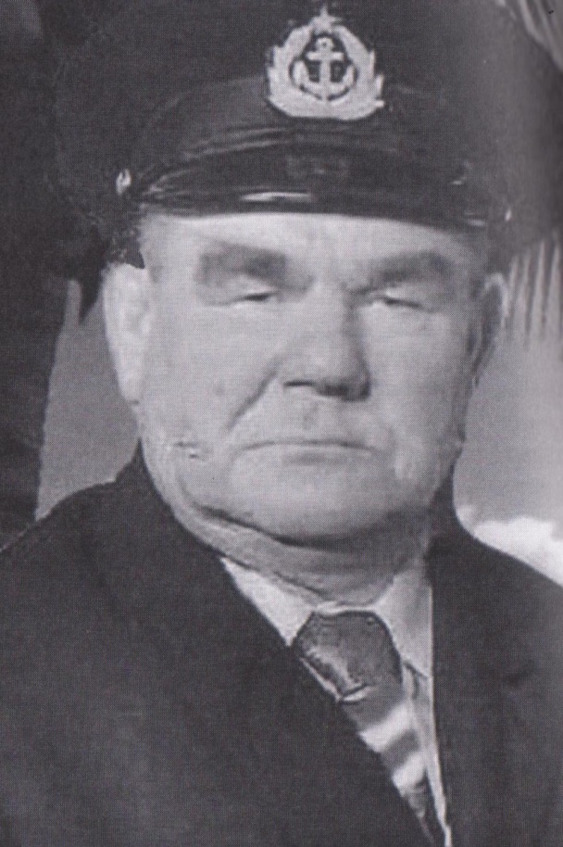
Volodin A.A.
On April 27, 1946, Alexey Volodin was hired by the Neukuhrensky Fish Factory as captain of a motorcycle boat. A little later, several small vessels (MRT) were received, which, even with minimal equipment, proved to be positive.
In each voyage Captain Volodin came out confidently and calmly. He had no fear of the unfamiliar Baltic. He left it forever on the steep slopes of the Northern Donets, in his first combat attack, in 1942, on trench the enemy. Since then, where there once were feelings of doubt, now lived reason, knowledge, solid calculation and natural savvy. Only on these, so-called whales sprouts and matures professional experience – argued Alexey Artemyevich.
– Captain! – My father liked to speak – Mind, Honor and Conscience of the ship, even as small as an MRT. For conscientious work Captain Volodin A.A. with his team of sailors was repeatedly award a prize and encouraged by cash payments.
In December 1947 he was elected a deputy of the Local Councils. In December 1953, the name of Captain Aleksey Artemyevich Volodin was included in the book of Honor of the Baltgosrybtrest and the trade union committee. In 1958, The Motherland added a medal “For Labor Valor” to the combat awards of a WWAR participant.
In the mid-sixties, the military wounds had an impact on the health of captain Volodin and the medical commission closed his way out to sea, but allowed him to work in the port. Alexey Artemyevich finished his career in May 1975 as senior assistant captain in the port tug RBT-13.
On September 19, 1976, after a long illness, the veteran of the Great Patriotic War, Captain Volodin Aleksey Artemyevich passed away. Eternal memory to the pioneers and founders of the PBORF fishing industry in Pionersk, Kaliningrad region, who made their way to the world’s oceans.”
On September 1, 1946, a primary school was opened in the village of Neukuhren. Schoolchildren gathered about 100 people. She was located in a small German house. And in 1947 she became a seven-year school. Then, in 1958, a new school was built, designed for 700 students. In 2007, a new modern secondary school was opened on Fleet Street. But by the end of 2018, this school is no longer able to accept the growing generation of the city Pioneersk.
In the autumn of 1946, Yuri Fomenko, Devyaterikov, Klimov, and Ionkin were also sent from Astrakhan to the base. All of them subsequently went to sea by captains and had excellent production figures.
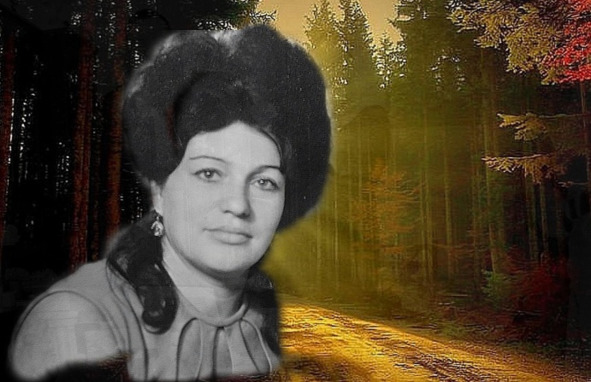
L.I. Fomenko.
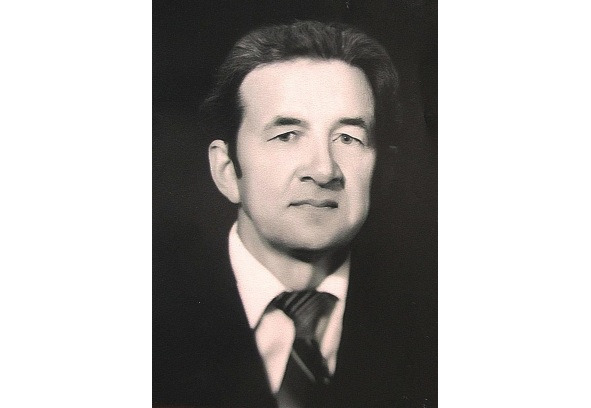
Yuri Ivanovich and Lyubov Fomenko.
Yuri Fomenko then began to work as an inspector, was the chief captain. He was highly respected among the fishers. A long illness soon prevented him from going out to sea. His wife, Lyubov Ivanovna as a medic, supported him in every possible way. In 2012, Yuri Ivanovich died.
Lyubov Ivanovna Fomenko (Gavrashenko) was born in Kherson, graduated from Kherson cult pro-enlightenment school. In 1971 she graduated from Kaliningrad Medical School with a red diploma. At Pioneers Hospital she worked in the maternity ward. Then she went to work in the Pioneers Base in the department of DEA (the deratization of ships, epidemics, and contagious diseases). She supplied medicines for the ship’s first aid kits, instructed the captain’s senior assistants, and carried out the deratization and disinfection of ships.
They raised two sons, Alexander and Yuri. Yuri Yuryevich, a lieutenant colonel, already retired, lives in Astrakhan. Alexander Yuryevich was born in 1963, graduated from the Kvmu named Frunze, served in the Navy. In the rank of captain of the 2nd rank in the reduction of
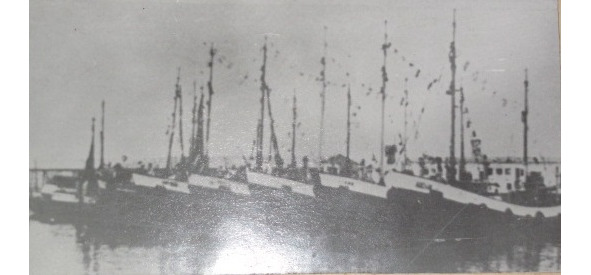
The first vessels – such as KFC and MRT.

